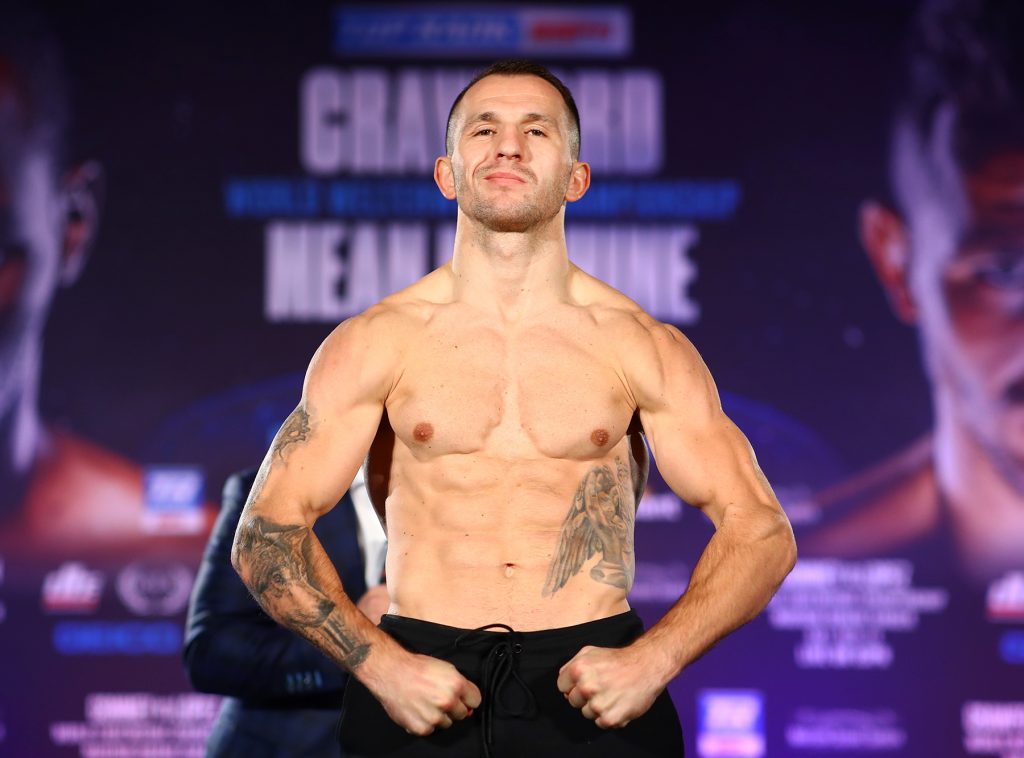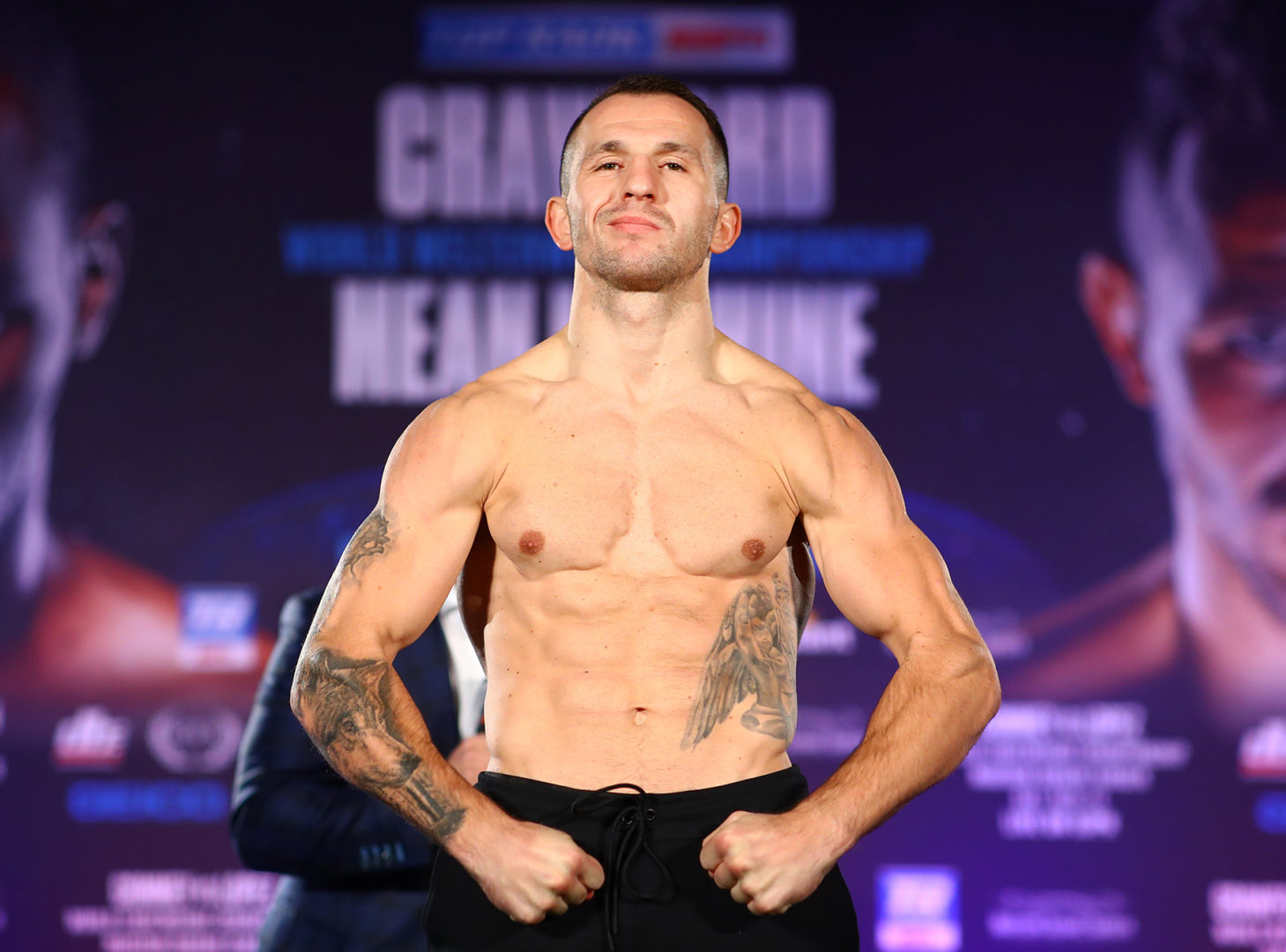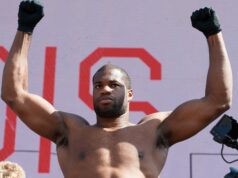
By Bart Barry-
Saturday on ESPN+ oncedefeated Lithuanian welterweight Egidijus Kavaliauskas made a decisive and violent recovery of his mainevent match with Canada’s oncedefeated Mikael Zewski, stopping the Québécois with a fabulous round 7 uppercut from which Zewski still hadn’t recovered at the opening of round 8, when Kenny Bayless prudently stopped their match. How much better Kavaliauskas looked across from Zewski than Bud Crawford last December was a function of how much better Crawford is than Zewski.
It was an honest effort and an honest broadcast, the very thing a $5.99 monthly subscription should purchase. It hadn’t the nauseating hyperbole that chases our sport most everywhere it goes. There were guys who’d each had a shot of some sort and lost to better men. It was good middlebrow fare, boxing that sticks to your ribs, resonates very little and exacts even less. The commentary was given by two guys who like one another and do their jobs well. Even if neither liked the other nor was very good at commentary, fact remains a two-man booth is better than a three-.
Bernardo Osuna is something of a litmus test for aficionados; your familiarity with him is about how familiar you are with our beloved sport. Before he joined ESPN he ran a two-man booth for Telefutura’s fantastic “Solo Boxeo” program, on which promoters Top Rank and Golden Boy built many if not most future titlists, mostly in the Southwest.
I recall sitting a few feet from him in a makeshift boxing venue, the parking lot of a Tucson nightclub, 14 or 15 years ago – an empty ambulance abandoned on a nearby sidestreet to check some regulatory box or other – while Osuna and his cohost recorded their evening’s leadin. With only a wrinkled index card scotchtaped to the bottom of a camera for notes, Osuna nailed his first take, nonchalant, then started conversing with someone in a different language. I remember thinking he might have the most talent on the evening’s card. Later that night, if memory serves, Jesus Soto-Karass beat “Cool” Vince Phillips into retirement.
Osuna has an uncommon facility in two languages, as viewers might’ve heard and marveled-at, Saturday, with his calling play-by-play in English then doing on-the-fly Spanish translation between rounds. He’s too talented for conventional broadcasting roles and woefully underutilized as a postfight interviewer. That’s hardly his employers’ faults. What, after all, do you do with a guy capable of national-broadcast-quality work in two languages simultaneously – lend him to the United Nations?
Then there’s Timothy Bradley, who’s still learning his craft but vulnerable and unpredictable and likable – one of not even a handful of professional athletes who might make a good friend, and the only man or woman or child Terence Crawford approaches at ringside. Osuna and Bradley call a card like college roommates; maybe it’s not polished enough for whatever prepositionally historic thing ESPN usually broadcasts – Saturday night, apparently, the Lakers became the first NBA team, ever, to win two consecutive series, in five games, after losing the first game of each, and good God, but you bore witness to it! – but it’s exactly right for Kavaliauskas TKO-8 Zewski, a mainevent that would warrant an 11-hour undercard were it in the U.K. and a handful of Lennox Lewis comparisons to Lennox Lewis by Lennox Lewis if it were on Fox Sports.
I spent some of Saturday’s mainevent doing an examination of conscience, as it were, concerning my tolerance for Kavaliauskas-Zewski. Would I have watched it if there weren’t a column to write the next morning? No. Did I remember anything about either guy before the opening bell? No. Did I enjoy the fight for being evenly matched? Yes. Did I enjoy the match because both fighters were white? Hmm.
That’s the very part of my conscience I wished to examine (and how thrilling could the fight have been, honestly, if I used it as a barometer for my own racial bias?). This isn’t a question of racism, as I see it; cheering for someone because he looks like you is acceptable in most cases – and the more specific, the more acceptable; “Paddy O’Sullivan is my favorite because he’s an Irish Catholic from Boston!” is more acceptable than “Bill Smith is the best because he’s white” – while cheering against someone because he doesn’t look like you is unacceptable in most cases, though, again, specificity probably matters. There are power dynamics and a majority/minority distinction, here, too, which is why a white president of the United States stoking white grievance is reflexively more offensive than Joe Frazier saying he was taught always to cheer for Black fighters.
The purpose of this, all of this, every last molecule of this, if there’s any purpose whatever, is to know oneself better. It’s necessary to suspend moral judgement of oneself to get very far in the exercise. That’s what the cheer-for-someone permission slip above is about; if I’m more drawn to Kavaliauskas-Zewski than Broner-Theophane, I want to be able to acknowledge it, not in the name of eradicating the preference or reforming myself so much as having a better inventory at hand.
The deeper I thought this question through the better I felt about boxing; it’s a tangle enough of ethnic and national interests that most racist white Americans long since migrated away from our sport. Boxing gyms, too, are some of the last diverse places in America where race can be discussed in good-faith, because as a local fighter once put it: “If you don’t like Puerto Ricans, just be honest and tell me – I’m going to punch you in the face anyway.”
Bart Barry can be reached via Twitter @bartbarry








